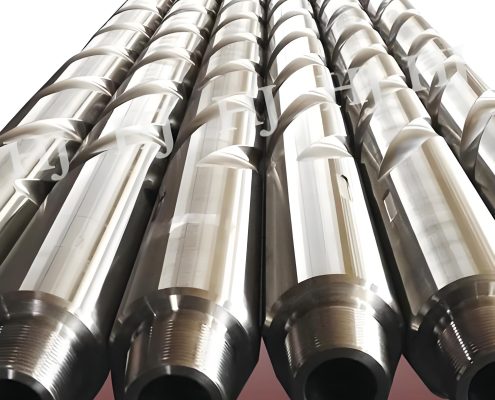Future Energy Steel offers high-quality API Spec 7-1 Drill Collar designed for the demanding oil and gas industry. These drill collars come in various dimensions and types, including standard and non-magnetic options. They feature high torsional strength, excellent pressure and temperature resistance, and seamless construction for enhanced safety and efficiency. Available connections include IF, FH, REG, and NC. Ideal for applications in challenging drilling environments, these drill collars ensure reliable performance and operational efficiency. For more details or quotations, please contact us at [email protected].
FAQs
What is Drill Collar?
A drill collar is a heavy, thick-walled steel pipe used in drilling oil and gas wells. It is a crucial component in the drill string assembly and serves multiple functions essential for efficient and safe drilling operations.
What Are the Functions of Drill Collar?
Provide Weight on Bit: Drill collars add weight to the drill bit, which is necessary to maintain the force required to penetrate rock formations. This weight helps maintain the bit’s penetration rate and overcome resistance in harder rock layers.
Stabilize the Drill Bit: Drill collars provide weight and rigidity to stabilize the drill bit, preventing excessive vibration and maintaining a steady drilling operation. This stability is crucial for preventing bit wear and achieving accurate wellbore trajectories.
Control Wellbore Direction: Drill collars contribute to the wellbore’s directional control. Their added weight and rigidity help keep the bit on the desired path, especially in deviated or horizontal wells.
Transmit Drilling Fluids: Drill collars are part of the drill string assembly through which drilling fluids (mud) are circulated to the bit. This fluid helps to cool and lubricate the bit, carry away cuttings, and maintain well pressure.
What Are the Types of Drill Collars?
Standard Drill Collars
Material: Made from high-strength carbon or alloy steel, such as AISI 4145H.
Design: They usually have a thicker wall than drill pipes, and their external and internal diameters are designed to handle high stresses.
Heavy Weight Drill Collars (HWDC)
Material: Similar to standard drill collars, they are designed with an even greater weight to provide additional force on the bit.
Design: They have a smaller outer diameter but thicker walls than standard drill collars.
Non-Magnetic Drill Collars
Material: Made from non-magnetic alloys to avoid interference with downhole measurement tools, such as magnetic resonance or directional sensors.
Design: Used in applications where magnetic interference must be minimized.
Premium Drill Collars
Material: Constructed from high-grade steel or alloy materials with advanced manufacturing processes for improved performance and durability.
Design: Often includes features like enhanced wear resistance or special coatings.
What Are the Applications of Drill Collars?
Drill collars are used in various applications in the oil and gas drilling industry due to their critical role in maintaining the stability and efficiency of drilling operations. Here are the primary applications of drill collars:
1. Weight Transfer to the Bit
Application: Drill collars transfer weight from the drill string to the drill bit. This weight must apply sufficient force to the bit to penetrate rock formations effectively.
Importance: Proper weight transfer ensures that the bit maintains a high penetration rate (ROP) and can break through different rock types.
2. Wellbore Stabilization
Application: Drill collars help stabilize the drill bit and prevent excessive vibration and bouncing by providing a heavy, rigid section of the drill string.
Importance: Stabilization is crucial for maintaining a steady drilling process, reducing bit wear, and achieving a more accurate wellbore trajectory.
3. Directional Drilling
Application: In directional and horizontal drilling, drill collars control and maintain the orientation of the wellbore. They help keep the bit on the desired path, especially in deviated wells.
Importance: Ensures the wellbore follows the planned trajectory, essential for accessing specific subsurface targets or reservoirs.
4. Drilling Fluid Circulation
Application: Drill collars are part of the drill string through which drilling fluids (mud) are circulated. These fluids cool and lubricate the bit, carry away rock cuttings, and maintain pressure in the wellbore.
Importance: Effective fluid circulation helps prevent the bit from overheating, keeps the wellbore clean, and ensures optimal drilling performance.
5. Managing Downhole Stresses
Application: Drill collars help manage the axial and radial stresses encountered during drilling. They provide the necessary rigidity to withstand high pressures and forces.
Importance: Proper management of downhole stresses prevents damage to the drill string and the wellbore, reducing the risk of incidents such as stuck pipe or wellbore collapse.
6. Enhanced Rigidity for BHA (Bottom Hole Assembly)
Application: Drill collars contribute to the rigidity of the Bottom Hole Assembly (BHA), which includes the drill bit and other tools used in drilling.
Importance: A rigid BHA improves drilling accuracy and ensures that the bit remains properly aligned with the wellbore.
7. Preventing Bit Bounce and Vibration
Application: Drill collars help reduce bit bounce and vibration by providing additional weight and stabilizing the drill bit.
Importance: Reducing bounce and vibration extends the life of the bit and improves drilling efficiency.
8. Supporting Advanced Drilling Techniques
Application: Drill collars support advanced techniques and equipment in complex drilling operations, such as deepwater or high-temperature wells.
Importance: Ensures that the drill string can handle the extreme conditions and demands of specialized drilling operations.
9. Controlling Drilling Parameters
Application: By adjusting the number and placement of drill collars, operators can control various drilling parameters, such as weight on bit and drilling dynamics.
Importance: Fine-tuning these parameters helps optimize drilling performance and efficiency.
10. Facilitating Well Interventions and Repairs
Application: Drill collars are also used in well interventions and repairs, providing weight and support for milling or cleanout operations.
Importance: Essential for maintaining well integrity and addressing issues encountered during the life of the well.
What Are the Steel Grades of Drill Collars?
Drill collars are typically made from high-strength alloy steels designed to handle the significant stresses and harsh conditions encountered during drilling operations. The steel grades used in drill collars are selected for their mechanical properties, including strength, toughness, and durability. Here are the most common steel grades used for drill collars:
1. AISI 4145H
Composition: This alloy steel contains carbon, chromium, molybdenum, and manganese.
Properties: It is known for its high tensile strength, hardness, and toughness. It provides excellent wear resistance and can handle high stresses and impacts during drilling.
Application: Widely used for standard drill collars due to their robust mechanical properties and ability to perform under harsh conditions.
2. AISI 4130
Composition: Contains carbon, chromium, and molybdenum.
Properties: Offers good strength and toughness, though not as high as 4145H. It is used for drill collars where less extreme conditions are encountered.
Application: Used in less demanding applications or where cost considerations make it a suitable alternative to higher-grade steels.
3. AISI 4340
Composition: This alloy steel includes carbon, chromium, nickel, and molybdenum.
Properties: Provides superior toughness and strength, often used in heavy-duty applications
Application: Employed in specialized drill collars that need to withstand extreme stresses and impacts.


